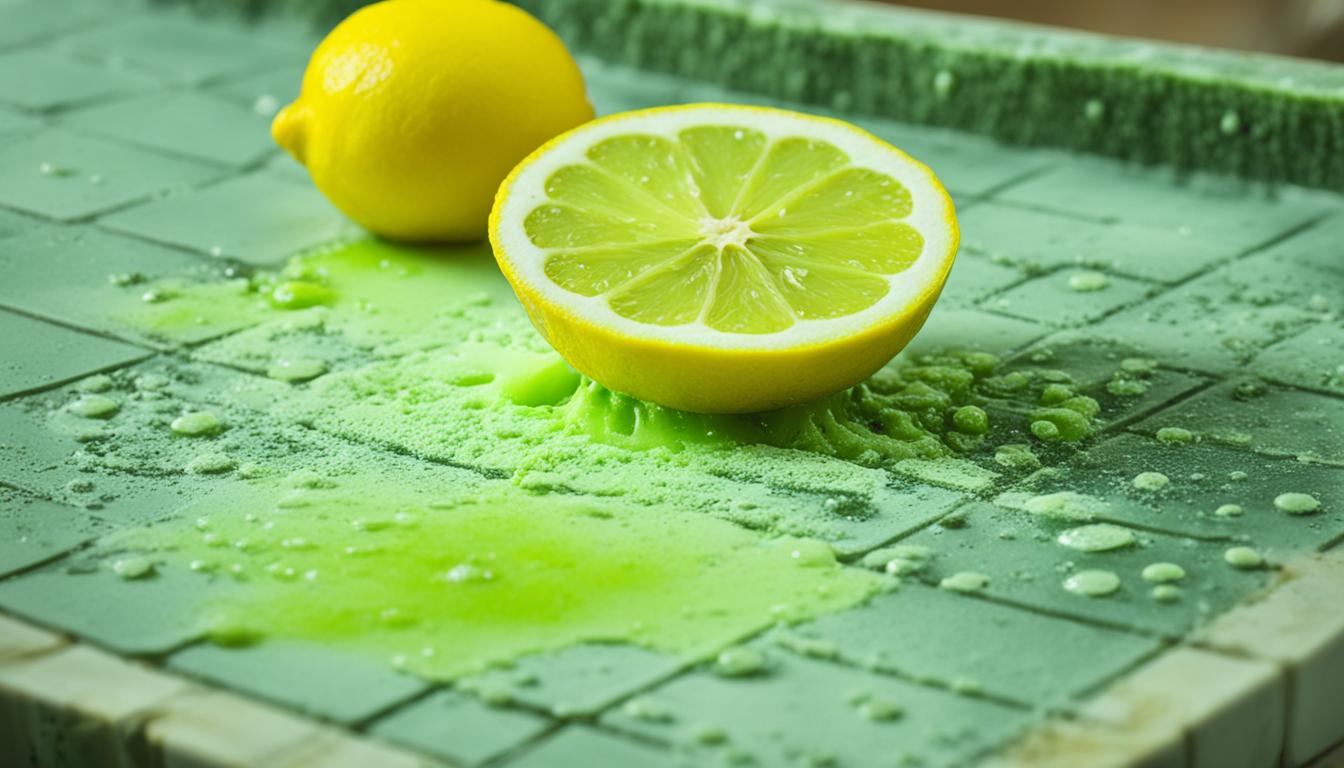
Lemon Juice Mold Removal: Does It Really Work?
When it comes to tackling mold and mildew in our homes, we often seek natural and cost-effective solutions. One such remedy that has gained popularity is the use of lemon juice. But does lemon juice really work for mold removal, or is it just a myth?
In this section, we will explore the effectiveness of using lemon juice for mold removal. We’ll delve into whether lemon juice can effectively kill mold and mildew, and provide insights into how to use it for optimal results.
Key Takeaways:
- Using lemon juice for mold removal is a popular natural remedy.
- Lemon juice contains citric acid, which has antimicrobial properties.
- Direct application, creating a lemon juice solution, or combining it with other ingredients are common methods of using lemon juice for mold removal.
- While lemon juice may be effective on certain surfaces, it may have limitations on porous materials.
- Professional mold assessment and remediation services are essential for thorough and long-lasting mold removal.
The Efficacy of Lemon Juice for Mold Removal
When it comes to mold removal, many homeowners are turning to natural remedies, and one popular option is lemon juice. In this section, we will explore the efficacy of using lemon juice for mold removal and provide you with practical tips on how to use it effectively.
Methods of Application
There are different methods you can employ when using lemon juice for mold removal:
- Direct Application: This involves applying lemon juice directly to the affected area. Simply squeeze fresh lemon juice onto the moldy surface and let it sit for a few minutes before scrubbing it off with a brush or cloth.
- Creating a Lemon Juice Solution: For larger areas or extensive mold growth, you can create a lemon juice solution by diluting freshly squeezed lemon juice with water. Mix equal parts lemon juice and water in a spray bottle and spray it onto the moldy areas. Leave it on for about 10 minutes, then scrub and rinse the surface thoroughly.
- Combining Lemon Juice with Other Ingredients: Lemon juice can be combined with other natural ingredients, such as baking soda or vinegar, for enhanced mold removal. These combinations create powerful cleaning solutions that effectively kill mold and break down stains.
Best Surfaces for Lemon Juice Mold Removal
Lemon juice can be effective on various surfaces, including tile, grout, glass, and porcelain. Its acidic properties help break down mold and remove stains, making it a versatile option for many household surfaces.
Potential Limitations of Lemon Juice Mold Removal
While lemon juice can be an effective natural mold removal solution, it’s important to note that it may not be suitable for all situations. Lemon juice is best used for light to moderate mold growth and surface stains. If you’re dealing with extensive mold growth or mold-infested materials, it’s advisable to seek professional assistance for thorough remediation.
Remember, mold is not just a cosmetic issue but also a health hazard. It’s crucial to address mold problems promptly and effectively to safeguard your home and the well-being of your family.
When using lemon juice for mold removal, always wear protective gloves and ensure proper ventilation in the area. Remember to conduct a patch test on a small, inconspicuous area before applying lemon juice to larger surfaces.
To enhance the effectiveness of lemon juice mold removal, it’s recommended to regularly clean and maintain your home, ensuring adequate ventilation and keeping moisture levels in check. Prevention is key to mitigating future mold growth. However, if you notice persistent or recurring mold problems, consult a professional mold remediation service for a complete assessment and comprehensive solutions.
<!–
| Comparing Lemon Juice with Other Mold Removal Options | Lemon Juice | Vinegar | Bleach |
|---|---|---|---|
| Mold Killing Power | Effective on light to moderate mold growth | Effective on most types of mold | Effective on most types of mold, but can damage certain surfaces |
| Natural or Chemical | Natural | Natural | Chemical |
| Safety Precautions | Minimal safety precautions required | Moderate safety precautions required due to strong odor | Requires strict safety precautions, including proper ventilation and protective gear |
–>
Using lemon juice for mold removal offers a natural and eco-friendly alternative to chemical cleaners. It’s an effective option for light to moderate mold growth and surface stains. Remember, prevention and regular maintenance are key to minimizing mold problems in your home. Stay proactive and take the necessary steps to ensure a safe and mold-free living environment.
Conclusion
After thoroughly examining the effectiveness of lemon juice for mold removal, it is clear that lemon juice can indeed kill mildew and mold. The high acidity and natural antimicrobial properties of lemon juice make it a viable option for tackling mold-related issues in your home.
However, it is important to note that while lemon juice can be effective in small-scale mold removal tasks, it may not be suitable for severe or widespread mold infestations. In such cases, it is recommended to seek professional mold assessment and remediation services to ensure thorough and long-lasting results.
Before using lemon juice as a mold removal solution, it is essential to properly assess the affected areas and determine the extent of the mold growth. While lemon juice can help eliminate mold on various surfaces, it is advisable to test it on a small, inconspicuous area first to check for any adverse reactions.
In conclusion, lemon juice can be a useful tool for tackling mildew and mold problems, especially in small-scale situations. However, for more significant mold issues, it is best to consult professionals like Fix Mold Miami, who have the expertise and resources to provide comprehensive mold assessment and removal services.




